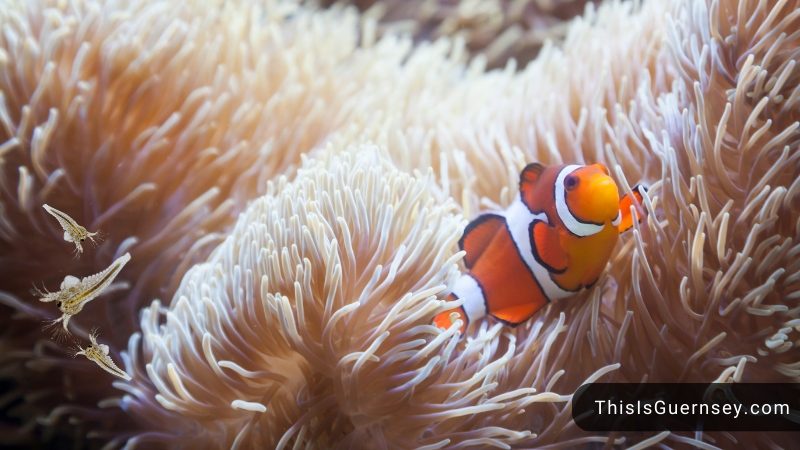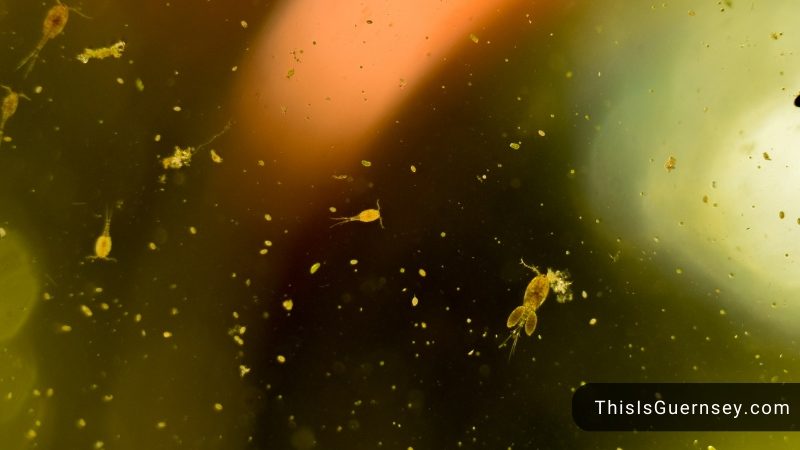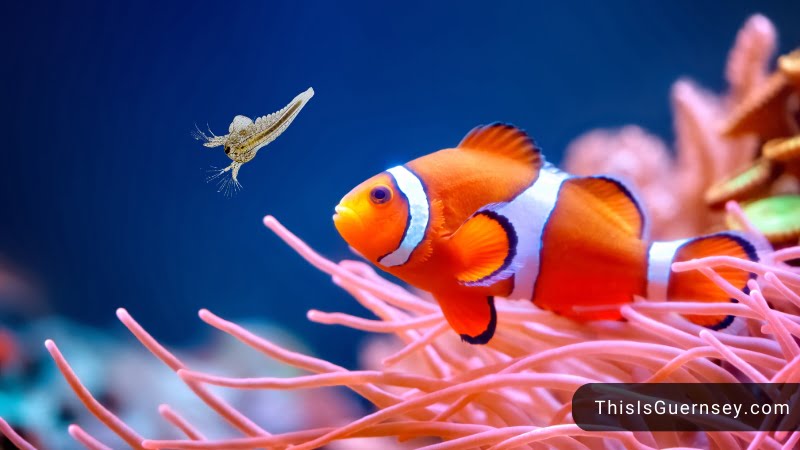Popular and durable saltwater fish that adapt well to life in captivity are clownfish. It’s critical to feed clownfish nutritious, well-balanced food in order to maintain their health and growth. The specifics of what to feed clownfish in an aquarium, including the best food for your clownfish, how frequently to feed them, and some feeding advice, will be covered in this article.
What Is The Best Food For Clownfish?
Clownfish make fantastic beginner fish for new aquarium keepers because they are famously easy to feed. In their natural habitat, these omnivores will eat just about everything including small crustaceans, copepods, algae, fish eggs, and larvae. While clownfish also can eat the majority of saltwater fish food, they also have a taste for flakes.
If you want your clownfish to thrive, you should provide it with a varied diet. Clownfish breed best when fed a diet that mimics their natural marine habitat, but they will readily eat most “live” frozen or dry foodstuffs.
What To Feed Clownfish?
Because clownfish are omnivores — meaning they consume both plants and animals—both types of food should be included in their diet. The best food for clownfish includes:
- Pellets: A high-quality this kind of food is a great staple for clownfish. Look for pellets specifically formulated for marine fish and containing a variety of ingredients, including shrimp, krill, algae, and other marine-based ingredients.
- Frozen Foods: Frozen foods such as shrimp, mysis shrimp, and krill are great for supplementing a clownfish diet. These should be thawed before feeding.
- Live Foods: Live shrimp or black worms are a great treat for clownfish, but they should not be relied on as the sole source of food.
- Vegetables: Some clownfish may also accept small amounts of blanched or frozen peas, lettuce, or spinach.
It’s crucial to provide clownfish a variety of foods and avoid relying too much on any one kind. Feeding your clownfish a range of foods will eventually assist to guarantee that they have a balanced diet that covers all of their nutritional demands.

What is the best pellet food for clownfish?
It’s advisable to pick a premium marine-based pellet meal made especially for clownfish when it comes to this. Some popular options include:
- New Life Spectrum Marine Pellets: These are made with high-quality ingredients, including krill, squid, and other marine-based sources of protein. These foods are the best.
- Hikari Bio-Pure Freeze-Dried Brine Shrimp: This is a great staple food for clownfish and is a good source of protein.
- Ocean Nutrition Formula One Pellet: These are specifically formulated for marine fish, including clownfish, and are made with a variety of high-quality ingredients, such as krill, shrimp, and algae.
- Cobalt Aquatics Marine Pellets: This food is made with a variety of marine-based ingredients, including krill and shrimp, and is a good option for clownfish.
Look for a fish pellets diet with a high protein level and a diversity of components when selecting one for your clownfish. Additionally, it’s crucial to select a meal that is suitable for your size of them and is manufactured with premium, natural components. Additionally, be careful to adhere to the manufacturer’s feeding guidelines because excessive feeding can have a negative impact on water quality and other issues.
What is the best-frozen food for clownfish?
A clownfish’s diet can benefit greatly from the increased nutrients and variety that a variety of frozen meals can offer.
Some of the best this kind of food for clownfish include:
- Mysis Shrimp: They are a nutritious and delicious treat for clownfish, and they are a great source of protein.
- Brine Shrimp: Brine shrimp are a classic for clownfish, and they are easy to find and relatively inexpensive.
- Krill: Krill are a great source of protein and are also high in omega-3 fatty acids, which can be beneficial for clownfish health.
- Squid: It is another great option for clownfish and can provide them with a tasty and nutritious needs meal.
When feeding frozen foods to your clownfish, it’s important to mix things up a little and thaw them before feeding, because it can be harmful to the fish. Additionally, be careful not to overfeed this kind of food, as this can lead to water quality issues and other problems. Instead, feed frozen foods in moderation, and be sure to supplement them with a variety of other foods, such as pellets, live foods, and vegetables, to ensure that your clownfish receive a well-rounded diet.
Do Clownfish eat brine shrimp and other live foods?
Yes, clownfish can eat brine shrimp and other live foods. In the wild, clownfish feed on a variety of small organisms, including small crustaceans, such as shrimp, copepods, and amphipods. In captivity, clownfish can also be fed live foods, including black worms, and other small insects and crustaceans.
Nori can provide clownfish with important nutrients, and they can be a great supplement to their diet, especially if they are fed in moderation. Additionally, feeding these can also help to keep clownfish active and engaged, which can be beneficial for their overall health and well-being.

Although live foods are ideal for Clownfish, they aren’t the only options on your table. One thing you can try feeding them is earthworms. Some fish love them while others don’t like these at all! However, it’s important to be careful when feeding live foods, as they can contain parasites and other harmful organisms that can be harmful to clownfish. Additionally, feeding zooplankton can also lead to water quality issues if they are overfed, so it’s important to follow the manufacturer’s feeding recommendations and to only feed these in moderation.
If you don’t have access to culture your Blackworms, consider ordering them online and keeping them in a pre-built tank inside the refrigerator.
One atypical live food item that you can add to your breeding Clownfish’s diet is mosquito larvae! Many varieties simply love them. You can easily find them outside during warmer temperatures. The first thing you need to do is find a stagnant body of water. Then, net the mosquito larva swimming around inside and thoroughly rinse them off in tap water.
If you have a Clownfish breeding tank, add these to it if you want fish food. They eventually die in saltwater but they swim around the aquarium and are a nutritious meal for your Clownfish.
How To Feed Clownfish?
Clownfish thrive on a twice-daily feeding schedule, but once a day will do for adults. Feeding intervals are 3 to 4 times a day with juveniles. Also, Feed Clownfish only so much as they can eat in three minutes. If you are feeding them once a day, then extend that time frame to five minutes.
It is also important to remove leftover food immediately so as not to disturb the water conditions of your aquarium.
Some feeding tips for clownfish
Here are some feeding tips that can help you feed your clownfish in areas: Clownfish are only comfortable in a designated portion of the tank, which is known as their ‘safety zone’. If you have any juvenile Clownfish, you will need to feed them near their safety zone.
Please breed clownfish in areas of the aquarium that doesn’t generate a lot of flow, as feeding them is easier to do this way. Add a small food cleanup crew to your Clownfish aquarium. Starfish, snails, and crabs will keep the tank clean by consuming leftover food and also scrubbing algae.
What Is The Best Food For Small Clownfish?
Baby clownfish have specific nutritional needs and feeding them the right food is crucial for their growth and survival. Some of the best food options for baby clownfish include:
- Newly hatched brine shrimp: Newly hatched small shrimp are also a great and easily available food source for baby clownfish. They are small and easy for young fish to consume, and they are rich in essential nutrients, such as protein and lipids.
- Microplankton: Microplankton are tiny, single-celled organisms that are found in the ocean, and they are a natural food source for baby clownfish. Microplankton can be purchased from aquarium supply stores, and they are a great source of nutrition for young fish.
- Finely chopped seafood: Finely chopped seafood, such as krill, squid, or shrimp, can be a great food source for baby clownfish live. It is important to chop the seafood into small pieces that are easy for the young fish to consume.
- Commercial fry food: Commercial fry food is specifically formulated for baby fish and can provide them with a well-rounded diet. These products are available in pellet or liquid form and are easy to find at aquarium supply stores.
When feeding baby clownfish, it is important to provide them with small, frequent meals throughout the day. Overfeeding can lead to water quality issues, so it is important to follow the manufacturer’s feeding recommendations. Additionally, it is important to keep the aquarium water clean and well-maintained to promote the healthy growth and development of the baby clownfish.
FAQs
Can clownfish eat tropical flakes?
Yes, clownfish can eat tropical fish flakes. Tropical fish flakes are a convenient and widely available food option for clownfish, and they can provide them with the essential nutrients they need to stay healthy.
What do clownfish like in their tank?
Clownfish is like a warm, well-maintained saltwater aquarium with plenty of hiding places and a variety of live or artificial coral reefs. They also need a safe, stable environment with good water quality and a strong water flow. In addition, it is important to provide clownfish with the right diet, including a variety of frozen or dried foods, such as krill, and mysis shrimp, as well as live and frozen fish food options, such as copepods and amphipods. Additionally, it is important to provide a host sea anemone for the clownfish to live in, as they often form a symbiotic relationship in the wild.
Do clownfish eat their eggs?
Yes, clownfish have been known to eat their own eggs. This behavior is not uncommon among clownfish and other species of fish that lay their eggs in a communal nest. Clownfish are known to fiercely defend their eggs and their territory, but they will also consume their own eggs if they become stressed, if the eggs are diseased or damaged, or if they are simply looking for a food source.
Conclusions
Clownfish are an omnivorous species in nature, which makes feeding them a convenient and easy task. However, since they are omnivores they need a variety of food types to meet their nutritional needs.
References:
- Clownfish – https://www.nature.com/articles/d41586-021-01418-9
- Facts about clownfish – https://www.nationalgeographic.com/animals/fish/facts/clownfish

Annette M. Chaney is an experienced marine biologist with over 20 years of experience as an aquarist and fishkeeper. She started her first aquarium at a young age, filling it with frogs and goldfish obtained from the ten-cent pet store.
Annette grew up caring for and breeding African Cichlids, which led to a hobby in high school that doubled as a profitable means. Attending Reed College gave her time to solidify herself as an accomplished aquarium caretaker with an eye for sales. After that, from 2009 – 2013, she studied at Roger Williams University – one of the most prestigious universities for Aquaculture and Aquarium in USA. She is the founder of AquariumCircle since 2010.
